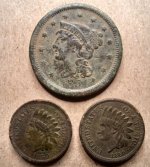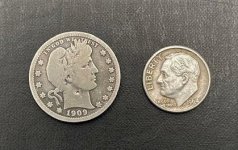batcap
Hero Member
Is gold-filled jewelry ever bonded to magnetic base metal?
It's pretty common for people testing jewelry or counterfeit coins to use a magnet. Obviously precious metals are non-magnetic, but what about the underlying base metal in gold-filled?
Two things came together to make me ask:
1) I sent some stuff off to ARAGold. I called about the settlement, and the woman said that it wasn't ready yet because the steel in gold filled objects may take a few extra days to dissolve.
2) I saw a very nice looking old gold-colored chain that I was highly tempted to buy and test with my GT-3000, but I ran it past a magnet and there was a weak attraction. Everything about this chain said 'quality'. It had a very nice gold tone that was not worn through at any point that I could find. The round spring type clasp was nicely decorated, but not karat marked. The chain itself, not just the clasp, was attracted to the magnet.
I'll buy that chain if there's reason to believe it's gold filled. It's cheap enough that I could take the hit if it wasn't, but I wanted your advice first.
I ran a magnet over my gold filled scrap, the only things that stuck were some clasps and a watch band that I hadn't yet separated the gold caps.
This one object was not worth typing all that out; but for every reader's future reference - have you ever seen magnetic gold-filled chain?
Thank you for reading.
It's pretty common for people testing jewelry or counterfeit coins to use a magnet. Obviously precious metals are non-magnetic, but what about the underlying base metal in gold-filled?
Two things came together to make me ask:
1) I sent some stuff off to ARAGold. I called about the settlement, and the woman said that it wasn't ready yet because the steel in gold filled objects may take a few extra days to dissolve.
2) I saw a very nice looking old gold-colored chain that I was highly tempted to buy and test with my GT-3000, but I ran it past a magnet and there was a weak attraction. Everything about this chain said 'quality'. It had a very nice gold tone that was not worn through at any point that I could find. The round spring type clasp was nicely decorated, but not karat marked. The chain itself, not just the clasp, was attracted to the magnet.
I'll buy that chain if there's reason to believe it's gold filled. It's cheap enough that I could take the hit if it wasn't, but I wanted your advice first.
I ran a magnet over my gold filled scrap, the only things that stuck were some clasps and a watch band that I hadn't yet separated the gold caps.
This one object was not worth typing all that out; but for every reader's future reference - have you ever seen magnetic gold-filled chain?
Thank you for reading.





